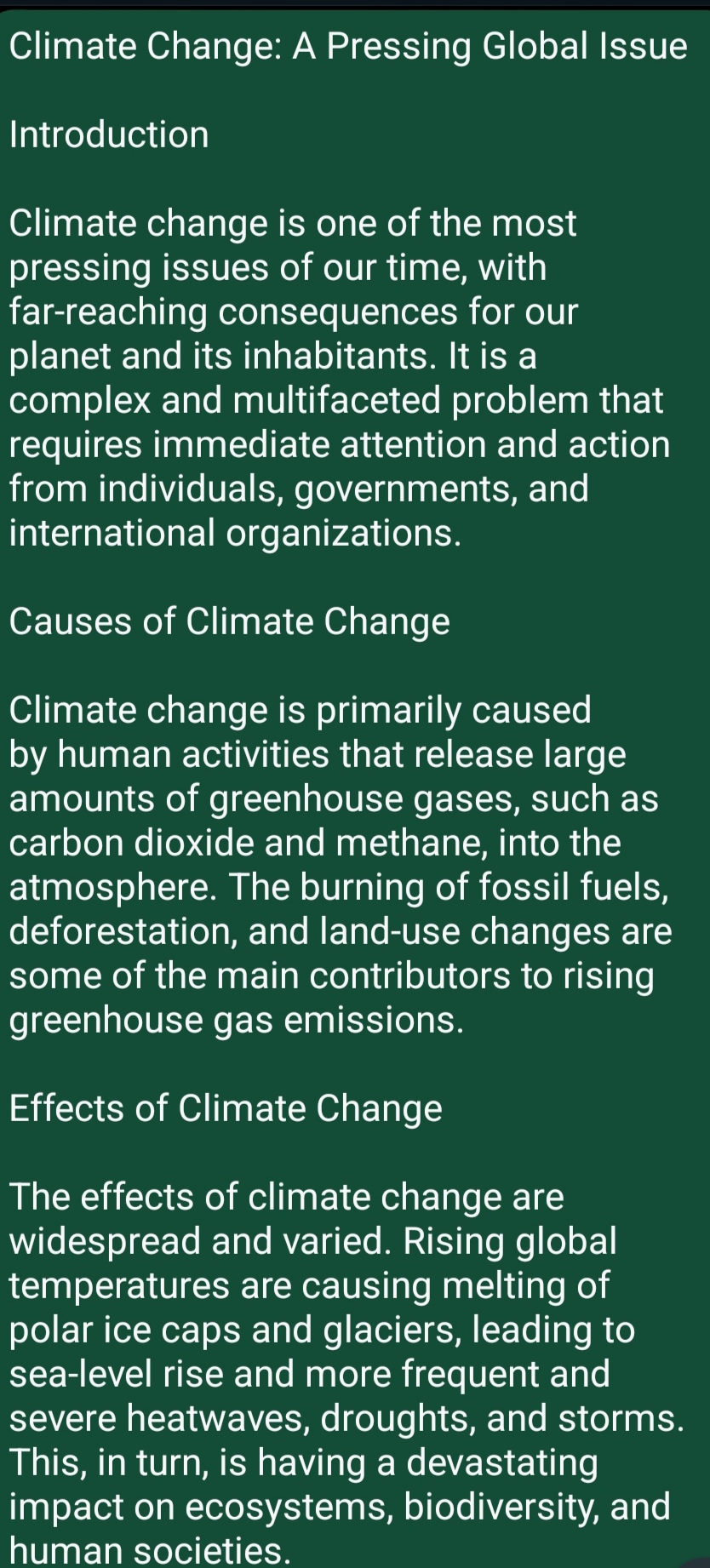Introduction
Climate change is one of the most pressing issues of our time, with far-reaching consequences for our planet and its inhabitants. It is a complex and multifaceted problem that requires immediate attention and action from individuals, governments, and international organizations.
Causes of Climate Change
Climate change is primarily caused by human activities that release large amounts of greenhouse gases, such as carbon dioxide and methane, into the atmosphere. The burning of fossil fuels, deforestation, and land-use changes are some of the main contributors to rising greenhouse gas emissions.
Effects of Climate Change
The effects of climate change are widespread and varied. Rising global temperatures are causing melting of polar ice caps and glaciers, leading to sea-level rise and more frequent and severe heatwaves, droughts, and storms. This, in turn, is having a devastating impact on ecosystems, biodiversity, and human societies.
Consequences of Climate Change
The consequences of climate change are far-reaching and devastating. More frequent natural disasters, food and water scarcity, and the spread of diseases are just a few of the many consequences of climate change. It is also having a significant impact on the global economy, with estimated losses projected to be in the trillions of dollars by the end of the century.
Solutions to Climate Change
While the challenges posed by climate change are significant, there are many solutions that can help mitigate its effects. Transitioning to renewable energy sources, increasing energy efficiency, electrifying transportation, and carbon capture and storage are some of the key solutions. Additionally, reforestation efforts, sustainable land-use practices, and climate-resilient infrastructure development can also help.
Conclusion
Climate change is a pressing global issue that requires immediate attention and action. While the challenges are significant, there are many solutions that can help mitigate its effects. It is essential that individuals, governments, and international organizations work together to address this critical issue and ensure a sustainable future for all.
Causes of Climate Change
The main cause of climate change is the increasing levels of greenhouse gases in the Earth's atmosphere. These gases, such as carbon dioxide (CO2), methane (CH4), and water vapor (H2O), trap heat from the sun and prevent it from being released back into space, leading to a rise in global temperatures.
The main human activities that contribute to the increase in greenhouse gases are:
1. Burning of fossil fuels: The burning of coal, oil, and gas for energy releases large amounts of CO2 into the atmosphere.
2. Deforestation: The clearing of forests for agriculture, urbanization, and other purposes releases carbon stored in trees and reduces the ability of forests to act as carbon sinks.
3. Land-use changes: Changes in land use, such as the conversion of natural habitats to agricultural land or urban areas, lead to the release of stored carbon and reduce the ability of ecosystems to sequester carbon.
4. Agriculture: The production of meat, especially beef, and other animal products leads to the release of methane and N2O, two potent greenhouse gase.
The effects of climate change are widespread and varied. Some of the most significant impacts include:
1. Rising global temperatures: The average global temperature has risen by about 1°C since the late 1800s, and is projected to continue to rise by another 2-5°C by the end of this century if greenhouse gas emissions continue to increase.
2. More frequent and severe weather events: Climate change is leading to more frequent and severe heatwaves, droughts, floods, and storms.
3. Sea-level rise: The melting of glaciers and ice sheets, and the expansion of seawater as it warms, are causing sea levels to rise.
4. Changes in precipitation patterns: Climate change is leading to changes in precipitation patterns, with some areas experiencing more frequent and severe droughts, and others experiencing more frequent and severe floods.
Consequences of Climate Change
The consequences of climate change are far-reaching and devastating. Some of the most significant impacts include:
1. Loss of biodiversity: Climate change is leading to the loss of biodiversity, as plants and animals are unable to adapt to changing conditions.
2. Food insecurity: Climate change is impacting agricultural productivity, leading to food insecurity and political instability.
3. Human migration and displacement: Climate change is leading to the displacement of people, especially in low-lying coastal areas and small island developing states.
4. Economic impacts: Climate change is having significant economic impacts, from damage to infrastructure and property, to impacts on tourism and agriculture.
Solutions to Climate Change
While the challenges posed by climate change are significant, there are many solutions that can help mitigate its effects. Some of the most important solutions include:
1. Transitioning to renewable energy sources: The transition to renewable energy sources, such as solar and wind power, can significantly reduce greenhouse gas emissions.
2. Increasing energy efficiency: Improving the energy efficiency of buildings, transportation, and industry can also reduce greenhouse gas emissions.
3. Electrifying transportation: The transition to electric vehicles can significantly reduce greenhouse gas emissions from transportation.
4. Carbon capture and storage: The development and deployment of carbon capture and storage technologies can reduce greenhouse gas emissions from fossil fuel power plants and industrial processes.
5. Sustainable land-use practices: The adoption of sustainable land-use practices, such as reforestation and agroforestry, can help sequester carbon and reduce deforestation and land degradation.
Conclusion
Climate change is a pressing global issue that requires immediate attention and action. While the challenges are significant, there are many solutions that can help mitigate its effects. It is essential that individuals, governments, and international organizations work together to address this critical issue and ensure a sustainable future for all.



You must be logged in to post a comment.